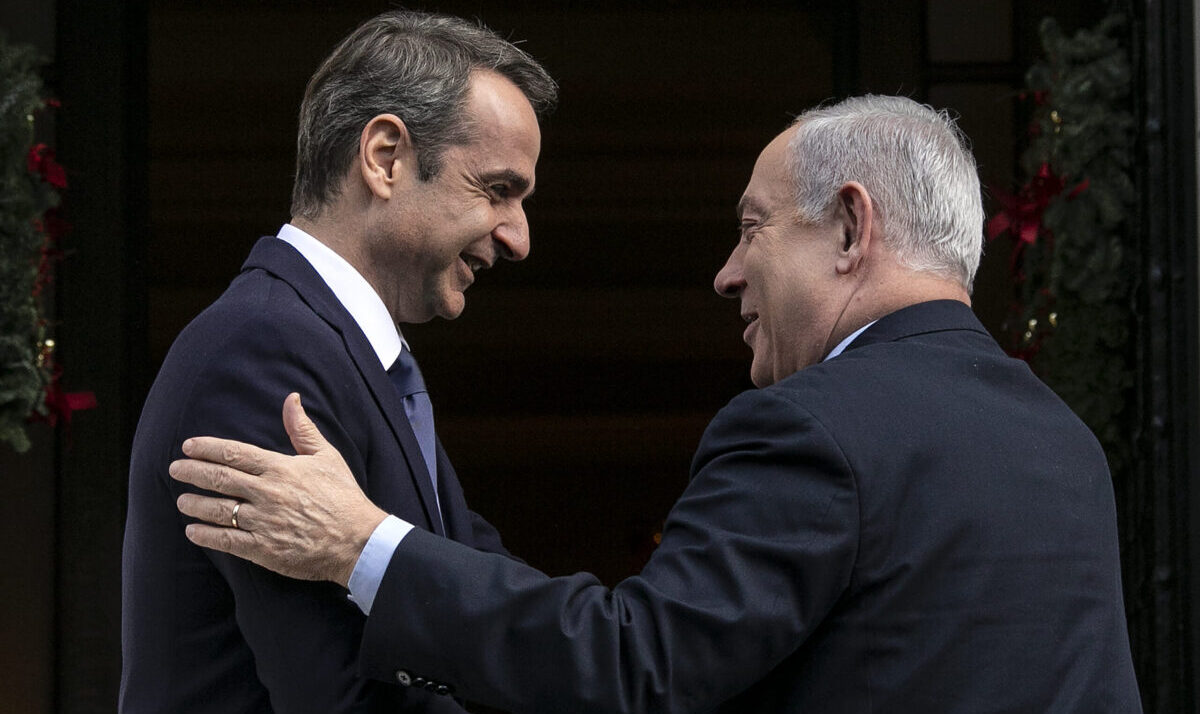ONLY IN TLF: Greece-Israel Talks on Aegean Defense System Eye Turkey, Spark Domestic Opposition Backlash
Greek Prime Minister Kyriakos Mitsotakis's recent high-level visit to Israel, aimed at deepening strategic ties, has stirred controversy domestically and raised eyebrows regionally, particularly concerning potential implications for Turkey. Reports suggest discussions centered on advanced defense cooperation, including a sophisticated air defense system for the Aegean Sea, new energy projects, and initiatives framed by Athens that potentially appeal to Ankara should it abandon its "revisionist policies." However, the visit and its reported agenda have drawn sharp criticism from Greece's opposition parties.
According to information obtained by Levant Files, Turkey's strategic interests were a significant undercurrent during the Prime Minister's talks in Israel. The prospect of Greece collaborating with Israel to deploy an advanced, technologically superior air defense system over the Aegean represents a potentially significant shift in the regional military balance. Alongside defense matters, discussions reportedly explored new energy ventures in the Eastern Mediterranean. Speaking to Levant Times, sources in Athens indicated these projects "would undoubtedly attract Ankara's interest if and when Turkey withdraws its revisionist policy," presenting a conditional opportunity linked to a change in Turkish posture.
Deepening Strategic Ties: Defense, Energy, and Regional Security
Prime Minister Mitsotakis engaged in comprehensive talks to bolster bilateral relations across defense, energy, and regional stability during his visit. A key component involved meetings with senior executives from Israel's leading defense industries, including Israel Aerospace Industries (IAI), Rafael Advanced Defense Systems, and Elbit Systems. These discussions reportedly covered potential co-productions, technology transfer, and joint research and development initiatives. The expansion of existing defense programs, such as collaborations on anti-aircraft protection systems—often referred to using the "dome" concept—and new partnerships in technological innovation were also on the table. However, criticism emerged regarding the perceived lack of formal Greek institutional representation accompanying the Prime Minister in these corporate defense meetings.
Beyond defense, the strategic partnership's energy dimension was reaffirmed. Both sides confirmed their commitment to the Great Sea Interconnector, the ambitious project aiming to link the electricity grids of Greece, Cyprus, and Israel, as well as the broader India-Middle East-Europe Economic Corridor (IMEC) initiative. Coordination on energy projects in the Eastern Mediterranean, focusing on hydrocarbon exploitation and infrastructure development, remained a priority.
Diplomatically, Mitsotakis held discussions with Israeli Prime Minister Benjamin Netanyahu and President Isaac Herzog. Talks addressed the pressing regional crises, including the situation in Gaza, Syria, and Lebanon, with an emphasis placed on securing the release of hostages and achieving a ceasefire in Gaza. The Greek side reiterated its long-standing support for a two-state solution to the Israeli-Palestinian conflict based on the 1967 borders. Within these strategic dialogues, the perceived threat from Turkey was reportedly analyzed, reinforcing the rationale for strengthening the Greek-Israeli alliance as a regional counterweight.
Shift in Aegean Defense Doctrine: The 'Achilles' Shield'
Coinciding with the Prime Minister's visit, the Greek Minister of National Defense, Nikos Dendias, made significant pronouncements regarding a fundamental shift in Greece's defense doctrine for the Aegean. Speaking publicly, Dendias declared a move away from the traditional reliance on the naval fleet as the primary defender of the Aegean islands. Instead, Greece is pursuing a new strategy to develop an anti-missile and drone defense system dubbed the "Achilles' Shield." He described this as a "more capable and cheaper system of multiple missile systems." Dendias justified this doctrinal shift by referencing a "tangible, stated threat facing us, ten times our capabilities," implicitly pointing toward Turkey. "If this program is executed," Dendias assured, "defending the homeland will be a substantial capability, not just rhetoric." He also announced transparency measures for defense procurement, including changes to how the Armaments Directorate is staffed and enhanced oversight capabilities.
Domestic Backlash: Opposition Parties Voice Criticism
However, the Prime Minister's trip and the government's strategic direction faced strong headwinds from opposition parties. The main opposition party, SYRIZA, criticized the visit as an attempt by the government to seek "an escape from its domestic problems" and accused Mitsotakis of "taking steps backward in defense." SYRIZA also voiced objections to the timing of the visit amidst the ongoing conflict in Gaza and called for "immediate political change."
The Communist Party of Greece (KKE) and the New Left party both condemned the visit, linking the deepening cooperation with Israel directly to Greek governmental support for Israeli military operations. KKE specifically argued that the Greece-Israel partnership primarily reinforces "American and NATO interests" in the region.
While PASOK, led by Nikos Androulakis, did not fundamentally oppose the strategic relationship with Israel, it directed its criticism towards the government's alleged "inactivation of the Greek defense industry."
PASOK demanded assurances that Turkey would not be integrated into the European defense architecture and stressed the need for greater European strategic autonomy in defense, independent of sole reliance on NATO.
Finally, Zoe Konstantopoulou's Course of Freedom party strongly disapproved of the visit and the strategic alignment. Konstantopoulou starkly contrasted priorities, stating, "We talk about people, you talk about money," highlighting the party's objections to the strategic cooperation with Israel, particularly during the current regional crisis.
Phot: Ert News
